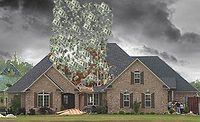Insurance Reform
Louisiana Passes ‘Fortified’ Legislation, Gives Homeowners Climate-Related Roof Protection
The $30 million appropriation by the state legislature provides “beyond-code” funding for new residential roofs to meet “Fortified” standards

Louisiana homeowners will have access to $30 million in state funding to help supplement the cost of reroofing from damage caused by winds and other weather-related events like Hurricane Laura that left waste to thousands of structures and caused billions of dollars in damage.
— Photo courtesy of Wikipedia
As reported last April by Roofing Contractor editor Chris Gray, Louisiana homeowners will soon be able to apply for grants to retrofit their roofs to “beyond-code" or "Fortified" construction standards, driving discounts reflected in their insurance premiums. The legislation comes on the heels of insurance reforms first made in Florida.
State lawmakers, led by Rep. Matthew Willard (D-New Orleans), sponsored the bill providing necessary funding for the Louisiana Fortify Homes Program, signed into law by Governor John Bel Edwards on June 2. The legislation is the second iteration of the LFHP, the first of which provided no funding from the state.
The law, known as Act 1, will allow homeowners meeting eligibility to apply for up to $10,000 in grants to fortify roofs that meet the Insurance Institute for Business and Home Safety’s ‘Fortified’ roof standard. The state allocated $30 million toward the program, according to notes from the legislative record and will begin operating on Oct. 1, 2023
“We passed a bill last year to create the Louisiana Fortify roof program,” Willard told a local FOX affiliate reporter. “What we discovered is that in that statute, it was permissive for insurance companies to grant a premium reduction, meaning that homeowners would only receive a premium reduction if their company wanted to grant that; I didn’t like taking a chance on that.”
Part of the package passed by lawmakers requires insurance companies to provide empirical data accurately reflecting the financial benefits of a Fortified roof when issuing discounts to policyholders replacing or retrofitting their roofs that then comply with Fortified standards.
The savings may have a substantial impact on insurance premiums as well as damage prevention from future weather-related events.
All insurable commercial and residential properties complying with the Fortified standard will qualify for a discount. Mike Huval, chair of Louisiana’s legislative House Insurance Committee, said the new statute would encourage more property owners to build to the Fortified standard outside the grant program.
Accompanying legislation requires insurers to offer an endorsement to policyholders who upgrade a non-Fortified roof to one that is Fortified-compliant after damage precipitates a reroof.
The requirement will take effect when carriers issue a new policy on a previously non-Fortified home.
Girding for a Stormy Future
The Fortified program is a roofing methodology based on decades of research that improves the longevity of a roof against hurricane-force winds and severe storms. It exceeds building code requirements and is, therefore, voluntary.
The method strengthens the integrity of a home’s roof through specialized nails, sealants and high-impact roof shingles. IBHS estimates the cost increase to be between $1,500 and $2,000 per roof. However, the improvements greatly enhance the likelihood a home’s roof will hold in place, based on extensive IBHS testing, including withstanding winds up to 130 mph and hail impacts as large as 2 inches in diameter.
Louisiana’s program is modeled off similar programs enacted or debated in several states, including Alabama, Kentucky, Minnesota and Iowa. A June 19 article in Insurance Journal cited that 6,000 Alabama homeowners have tapped into that state’s grant money to defray costs when installing a Fortified roof since enacting its own Fortified grant program in 2020.
Like in Florida, Louisiana’s property insurance market has suffered due to the constant battering from hurricanes. A total of 11 insurers that write homeowners coverage in Louisiana were declared insolvent between July 2021 and September 2022.
Louisiana will roll out on LFHP a first-come application basis, and homeowners must prove their eligibility for the grant: the home must be a single-family, owner-occupied primary residence with a homestead exemption; condominiums and mobile homes are not eligible.
The home must also be structurally sound unless damaged by a hurricane, non-hurricane-force wind, or damaged by hail. Homeowners must also provide proof of a wind insurance rider on their policy and, if located in a flood zone, provide evidence of existing flood insurance.
Upon grant approval, an LFHP-approved contractor must perform the work. Upon completion, the work will be evaluated by an IBHS review team to determine whether the work is sufficient for Fortified certification.
Homeowners may receive up to $10,000 to help defray costs but will most likely still have out-of-pocket costs as the average reroof for a typical home can cost between $13,000-$18,000.
Looking for a reprint of this article?
From high-res PDFs to custom plaques, order your copy today!






